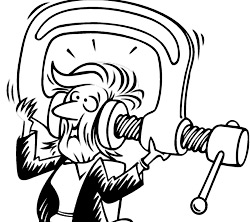Why is bad theater so bad?
Or to put it another way: Why does the prospect of bad theater raise such fear, and the experience of it engender such hatred? People aren’t just disappointed by bad theater. It seems to be sopoisonous that a single evening of it scars you for life. At least that seems to be the opinion of many theater critics, who give the impression that every time a bad production takes the stage, it threatens to send theatergoers screaming back to their couches and wide-screen TVs, never to venture out again.
I’ll agree that some experiences don’t bear repeating. This last summer I went golfing for the first time, and after staggering into the clubhouse suffering from heatstroke, false bonhomie, and incipient bursitis, the only thing I could think was “never, ever again.” (This was before I discovered there were still nine holes to go.) But are modern audiences really such wimps? Surely sitting in a dark room watching some people walk, dance, or sing in a manner you find displeasing isn’t that traumatic, right?
My friends, I’ve been to bad theater. I’ve seen more, and worse, bad theater than most of you will ever see. I’ve suffered through a solo adaptation of The Celestine Prophecy at AHA!; a fan-written live Twin Peaks episode at the Fringe Festival where Laura Palmer was played (badly) by a drag queen; Derek Horton’s avant-garde King Lear, a multicar artistic pileup featuring parade floats and a 12-year-old boy in the lead role. I saw the 5th Avenue musical Hot Shoe Shuffle, the story of seven tap-dancing Australian brothers, and yes, I saw Hunchback, the Musical at the King Cat (and despite what local legend says, Hot Shoe Shuffle was worse). I’ve seen world-renowned actresses like Claire Bloom and Ruby Dee bomb so loudly in their one-woman shows at ACT that you could hear it blocks away. At times, I half believe I’m still watching a production of The Duchess of Malfi at Pilgrim Center of the Arts on Broadway, and that the last 10 years have been a fever dream, an alternate reality that I’ve created in my head to escape the tedium. (It’s especially disconcerting since the center shut down eight years ago.)
And guess what? I’m still alive. I even stilllove theater.
But I’ll admit: Bad theater hurts like no other art form. Bad movies achieve cult status. Bad books are gleefully thrown across the room half finished. Bad TV…really, aside from Deadwood and The Daily Show, is there any other kind? But bad theater is its own special sort of pain, one where you can practically feel your cells age.
When an actor friend recently mentioned he’d left The Lady From Dubuque (which I sort of liked) at intermission, he suggested this might make a good column subject, but then reconsidered. “It would just ultimately undermine the theater world and paint it in a bad light,” he said. Well, maybe. But I just don’t have these same fears.
I decided to do some research, e-mailing a couple dozen friends of mine—half of them theater participants, the other half plain old theatergoers—with two questions: Under what circumstances have you left a show during intermission? And why exactly is bad theater so unbearable? I’ll be sharing their many thoughts in my column next week. (And if you’d like to send your own, I’m at jlongenbaugh@seattleweekly.com.)
Personally, I love the fact that I can now leave a show at intermission, a privilege I denied myself back when I was a reviewer for this paper. (Twice in memory I left shows at intermission, but this was because my dates told me that if I stayed, I needn’t call them after the show, or ever again.) I also like the fact that I can offer my theater friends whatever fatuous praise they need,knowing I won’t be caught out in print the following Wednesday. So, friends, if you see me at your show and youwant to know what I think, I’ll tell you right now—I loved it. Even if you don’t see me during the second act.








